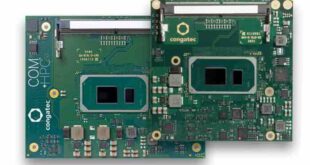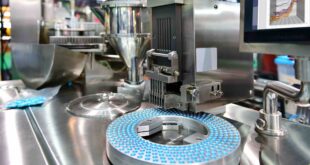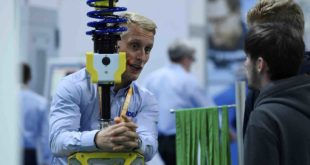Product experts will be on hand during the show in Birmingham, UK, from the 5th to the 7th of June to demonstrate igus designs that have been developed and tested in its 2,750m² test laboratory.
This largest test lab in the industry in which igus performs about 20% more tests then other manufacturers with test set-ups for chains and cables to bearings, allows engineers to precisely calculate the function and lifetime of all igus products.
3D printed, wear-resistant gear wheels is one such solution. The SLS iglidur i6 material used for the printed gears has been vigorously tested for a clear indication of predicted life.
In comparison tests, the gear printed with PA12 material failed after 521 cycles, as the heat generated by friction melted the plastic, and the gear made of iglidur i3 stopped at around 345,000 cycles.
The iglidur i6 gear, however, was still fully functional after 1 million cycles, showing only minor wear. The iglidur i6 gear was also compared with machined gears.
The gear made of POM (Polyoxymethylene) failed after 621,000 cycles, while the machined PBT (Polybutylene Terephthalate) gear stopped working after 155,000 cycles. Upon request, igus carries out customer tests so as to check the use of the products under individual conditions.
Whether in cars, commercial vehicles or special vehicles, the demands on energy supply solutions are becoming increasingly complex.
To protect them and optimise their service life, moving energy supply systems are increasingly being used.
The applications are many and varied; from seat adjusters or sliding/hatchback doors to adjustable headlights and the power supply to in-car entertainment systems.
All these applications have very limited space for the energy supply system yet must offer total reliability.
For these applications, igus has developed and refined lightweight compact energy chain systems, such as the easy-to-open E2 micro or one-piece E1, a kind of strip that can be easily varied in length.
Another advanced system on show at Automechanika is the low-profile drylin N linear guide.
Like all drylin products, the carriages run without grease or oil in an anodised aluminium profile. With industry needs in mind, igus drylin N offers extremely low profiles in several widths, and the iglidur J material used for this design make it a cost-effective and flexible guide system.
The iglidur J material is characterised most notably by its extremely low coefficients of friction in dry operation and very low stick-slip effect making it particularly important at very low speeds.
However, iglidur J can also be used for high speeds of over 1m/s. In both cases, the static friction is very low and stick slip does not occur.
 Engineer News Network The ultimate online news and information resource for today’s engineer
Engineer News Network The ultimate online news and information resource for today’s engineer


